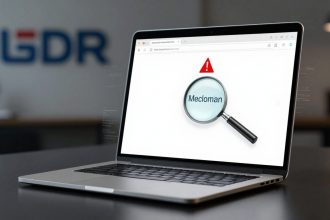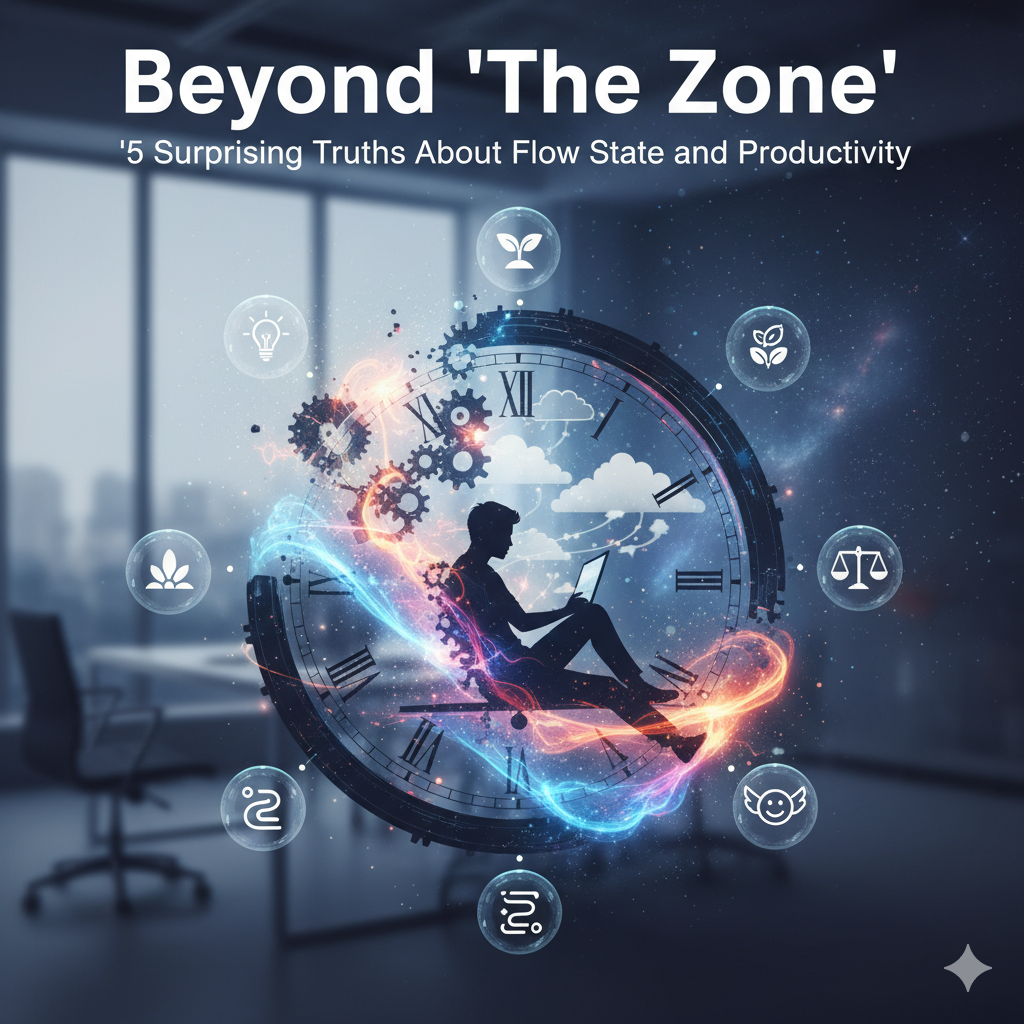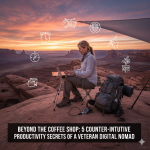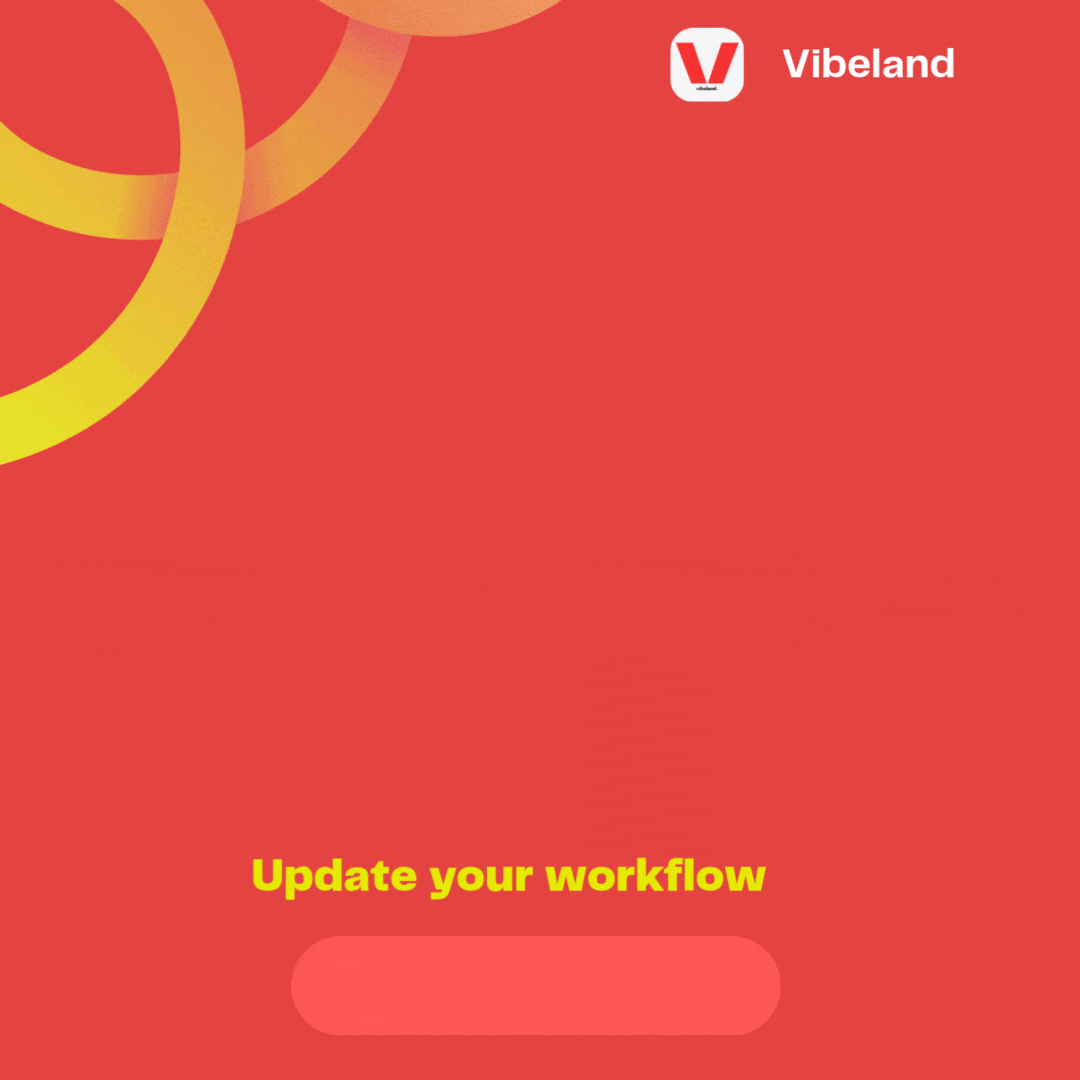Listen to this post: Beyond ‘The Zone’: 5 Surprising Truths About Flow State and Productivity
1.0 Introduction: The Quest for ‘The Zone’
We’ve all felt the desire to be “in the zone”—that elusive state of perfect focus where productivity feels effortless and time seems to disappear. It’s the holy grail of performance, sought after by artists, athletes, and knowledge workers alike. This experience isn’t just a feeling; it’s a well-documented psychological phenomenon known as “Flow,” a concept pioneered by psychologist Mihály Csíkszentmihalyi. More recently, author Cal Newport has explored its professional application through the framework of “Deep Work.”
While the benefits of achieving this state are undeniable, the path to getting there is more complex and surprising than most people think. This article distills the research to reveal five of the most counter-intuitive and impactful takeaways that can change how you approach focus, productivity, and your work itself.
2.0 Takeaway 1: Our “Busyness” Is a Trap That’s Killing Our Most Valuable Skill
In today’s workplace, busyness is often mistaken for productivity. However, the science of focus reveals a critical distinction between “Deep Work” and “Shallow Work.” Cal Newport defines Deep Work as professional activities performed in a state of distraction-free concentration that push your cognitive capabilities to their limit. In contrast, Shallow Work involves non-cognitively demanding, logistical tasks often performed while distracted.
A 2012 McKinsey study found that the average knowledge worker spends over 60% of their week on electronic communication and internet searching, with nearly 30% of their time dedicated to email alone. This constant engagement in shallow tasks creates a culture of “frenetic shallowness” that permanently reduces our capacity for deep, meaningful concentration, making it the primary reason our quest for focus is so difficult today. The core argument is captured in Newport’s “Deep Work Hypothesis”:
The ability to perform deep work is becoming increasingly rare at exactly the same time it is becoming increasingly valuable in the economy. As a consequence, the few who cultivate this skill, and then make it the core of their working life, will thrive.
In an economy that rewards rare and hard-to-replicate skills, the ability to work deeply is a superpower. The trap of constant “busyness” isn’t just making us less productive in the short term—it’s actively eroding our most valuable professional skill.
3.0 Takeaway 2: The “Flow State” Has a Dark Side
The concept of flow is almost universally praised as a key to happiness and peak performance. However, a closer look reveals a more troubling aspect. In his critique of the concept, researcher Ryan McCreedy points out a concerning idea postulated by Csikszentmihalyi himself: that flow could be achieved even in the most unideal conditions, such as forced labor. The suggestion was that even if a person is “objectively a slave, subjectively he is free.”
This challenges the popular notion that a simple “attitude adjustment” can remedy deep-seated job dissatisfaction. According to Self-Determination Theory (SDT), a truly optimal experience cannot be realized when work is perceived as an external burden imposed on you. Continually investing energy into a job that doesn’t align with genuine intrinsic motivation may jeopardize long-term mental and physical well-being, even if temporary states of flow are possible.
The implication is profound: flow is not a universal solution for a bad job. It can be a powerful coping mechanism for brutal situations, but it can also be used as a tool to manipulate people into being productive in “grizzly” circumstances, masking underlying issues that need to be addressed rather than escaped.
4.0 Takeaway 3: Your Brain’s Inner Critic Actually Shuts Down
Being “in the zone” is not just a feeling; it’s a measurable neurophysiological state. When you enter flow, your brain undergoes significant changes. Neuroscientific studies show that during flow, frontal lobe areas associated with self-reflection and self-consciousness become less active. Brain regions linked to negative thought are dampened, while areas that promote reward chemicals are activated.
This neurological reality directly maps onto the subjective experience of being in flow. The “loss of self,” the sense that your ego is “melting away,” and the complete absence of an inner monologue are not metaphors—they are the direct result of your brain quieting its own internal critic. You stop thinking about yourself and your worries, and become completely immersed in the task. Csikszentmihalyi describes this phenomenon as a form of “ecstasy”:
…ecstasy is essentially stepping into an alternative reality.
The profound sense of peace and performance that comes from flow is the literal experience of our brain silencing its own mechanisms for self-criticism and worry. This neurological peace is not just a pleasant side effect; it is the very mechanism that allows us to tackle tasks at the edge of our abilities without being paralyzed by the fear of failure.
5.0 Takeaway 4: To Focus Better, You Must Practice Being Bored
The ability to concentrate intensely is not an innate talent but a skill that must be trained like a muscle. In our hyper-connected world, our brains are wired for constant stimulation, which makes sustained focus incredibly difficult. To counter this, Cal Newport proposes a radical rule: “Don’t take breaks from distraction… instead take breaks from focus.”
The practical application of this is to schedule your internet use in advance. You might set aside specific blocks of time to check email and browse the web, but the time outside of these blocks must be kept completely free from such distractions. This forces you to rewire your brain to become comfortable with a lack of novel stimuli. It is, in essence, training your tolerance for boredom.
This approach acknowledges a simple truth: willpower is a finite resource that gets depleted with use. Instead of relying on sheer force of will to resist the siren call of distraction, the goal is to build routines and rituals that minimize the need for it. By training your tolerance for boredom, you are directly sharpening your ability to stay on this razor’s edge, making focus the default state when a worthy challenge appears.
6.0 Takeaway 5: Flow Lives on a Razor’s Edge Between Anxiety and Boredom
Flow doesn’t happen by accident. It occurs within a very specific set of conditions known as the “flow channel,” or the “challenge-skill ratio.” This is a “Goldilocks zone” where the task at hand is perfectly calibrated to your abilities. The activity must be challenging enough to require your full attention but not so difficult that it becomes overwhelming. Ideally, it should slightly exceed your current skill level.
There are two primary ways to fall out of this channel:
- If a task is too easy for your skill level, you will experience boredom and demotivation.
- If a task is too difficult for your skill level, you will feel overwhelmed, stressed, and anxious.
Finding flow requires staying on the razor’s edge between these two states. Csikszentmihalyi captured this principle perfectly:
The best moments usually occur when a person’s body or mind is pushed to its limits in a voluntary effort to accomplish something difficult and worthwhile.
This provides a practical “inner compass” for navigating your work. If you’re feeling bored, you need to increase the challenge—perhaps by adding a time constraint or a higher quality standard. If you’re feeling anxious, you need to either break the task down into more manageable steps or dedicate time to improving the necessary skills.
7.0 Conclusion: From Accident to Intention
Achieving deep focus and entering a state of flow is not a random occurrence reserved for a lucky few. It is a deliberate, trainable practice grounded in an understanding of psychology and neuroscience. By recognizing that our culture of busyness is a trap, acknowledging the potential dark side of flow, training our brains to embrace boredom, and learning to balance challenge and skill, we can move this powerful state from the realm of accident to one of intention.
As Cal Newport argues, “To leave the distracted masses to join the focused few… is a transformative experience.” Writer Winifred Gallagher came to a similar conclusion: “I’ll live the focused life, because it’s the best kind there is.”













